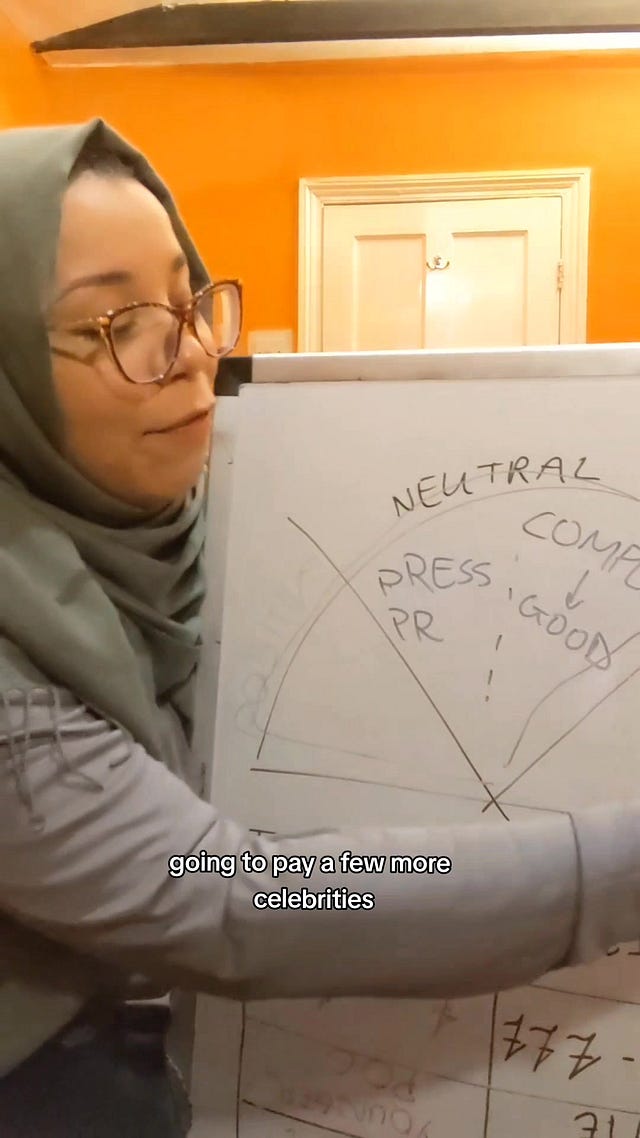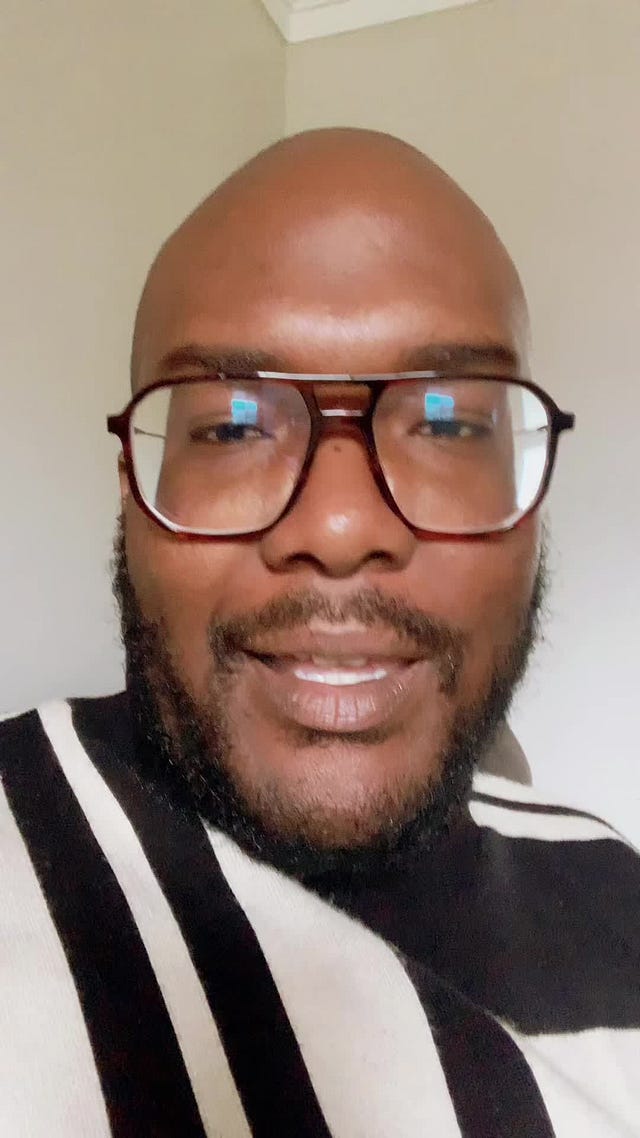Welcome to the bonus monthly edition of Antiracist Dietitian! Every month I will send out one extra newsletter to supporting subscribers, with a more personal or behind-the-scenes essay, perhaps a Q&A, and a whole lotta links and resources. This edition is free for all, to give you a chance to decide if you're into it, and if you'd like to upgrade your subscription or continue your paid subscription when they are turned back on later this month. Thanks for reading!
I've been quiet online the last few weeks. Actually, this newsletter was supposed to go out two Wednesdays ago, but every time I sat down to write, I felt subsumed with grief and fear. Grief for the overwhelming number of Palestinians suffering and dying in Gaza, and how poorly my usual news sources were covering it. Fear of hurting Jewish friends and readers if I talked about my grief in a way that left them feeling alienated or targeted. Grief for Palestinian, Muslim, and Arab diasporic friends and readers, whose calls for a free Palestine are distorted and interpreted as calls for violence or support of terrorism. Fear that every day that passed without me taking a public stance was further exposing me as a fraud.
This essay cannot be everything to everyone and that is the whole point.
When I was thinking about what I wanted the theme of these bonus monthly newsletters to be, I latched on to the idea of the "good enough" food justice advocate. There is this expectation that if you care about building a more just food system and a more just world, that you will do everything right. What you buy, who you buy from, how you feed yourself, who you vote for, what you read, what you believe, how you say it — no missteps allowed. This expectation of perfection is exhausting and senseless. There is no One Right Way to live a life seeking justice and equity for all, and I wanted to create a space that allows me to talk about my own missteps, trade-offs, and tough decisions. A space to be a human being.
Maybe you have heard about the concept of the Good Enough Mother? The phrase was coined in the early 1950s by a British pediatrician and psychoanalyst, who observed that it was beneficial for babies and children to sometimes experience the minor frustration of their caregiver failing to meet their every need. I love how this article describes the approach: "Children need their mother (or primary caretaker) to fail them in tolerable ways on a regular basis so they can learn to live in an imperfect world."
I will fail you, and I hope it will be in tolerable ways. I will fail you, because the world is imperfect and there are no blueprints for building a better one, no instructions to follow. There is only trial and error, working and learning alongside each other.
My "failure" these past few weeks — of not taking a stance on social media, of not speaking up on public platforms — has also been a survival strategy in this fractured and imperfect world. I have been navigating this time in ways that feel generative and important to me. I have been having one-on-one conversations with friends and loved ones. I have been going to marches and calling my representatives, asking for a ceasefire. I have been learning alongside other AANHPI folks, connecting the dots between the colonialism, military violence, displacement, and Western imperialism of the places where our families originated, and what is happening today. And I have been sneaking into my kids' rooms after they go to sleep and giving them one last kiss each night. Taking a moment every day to be present — to breathe in the smell of their hair, to touch their warm skin — and be thankful for the unearned peace of our lives.
Of course I want the release of the Israeli hostages, and I mourn the deaths and injuries of Israelis in this conflict. I am deeply concerned about the rise of antisemitism, and the threat of those who are co-opting this moment to act on their hatred of Jewish people. But loving the people of Palestine, wanting them to live free from oppression, and calling for the end of a genocidal campaign against them is not antisemitic. "Nobody's free until everybody's free," said Fannie Lou Hamer, who also knew that food could be a tool of oppression, as well as a path to self-sufficiency and power. We are all connected, through time and history. I reject the binary.
I have been so grateful to those who do have the words and the knowledge to publicly navigate through this tumultuous time with their writing and creating. Here is some of what has resonated with me:
Condemn murder. Condemn violence, imprisonment, all forms of oppression. But if your shock and distress comes only at the sight of certain brutalized bodies? If you speak out but not when Palestinian bodies are besieged and murdered, abducted and imprisoned? Then it is worth asking yourself which brutalization is acceptable to you, even quietly, even subconsciously, and which is not. — The Palestine Double Standard, from the New York Times (gift link)
I am a Black woman in America. I know what oppression looks like. I know what colonialism looks like. The pain of genocide is written into my DNA. And I know how the violence that Black people have struggled against for hundreds of years has been aided and abetted by “good” people who shake their heads sadly and say, “someone should stop that from happening to them,” while knowing that they personally would never be at danger from similar violence. I know deep in my bones that I am “them,” and will always be THEM. Be it Palestinian, Native, Uighur, Kurdish, Tigrayan - I will always recognize my kin in both oppression and liberation. — How To Keep Going, from
newsletter
How can a person make up for seven decades of misrepresentation and willful distortion in the time allotted to a sound bite? How can you explain that the Israeli occupation doesn’t have to resort to explosions—or even bullets and machine-guns—to kill? That occupation and apartheid structure and saturate the everyday life of every Palestinian? That the results are literally murderous even when no shots are fired? — No Human Being Can Exist, from n+1
And just to end on a lighter (but still resonant) note…
 Tiktok failed to load.
Tiktok failed to load.Enable 3rd party cookies or use another browser
What I'm Reading
When Diet Culture Comes For Babies - Romper. Many many Instagram accounts, momfluencers, and companies trying to push you to buy baby-food-related products are selling the idea that there is one "right" way to introduce solid foods and/or feed your baby — their way, of course — but the unspoken message that there is a set of rules that, if perfectly followed, will give you a child who happily eats everything on their plate always and forever is false. And it's not just making parents anxious:
Sure, yelling at your kid to eat isn’t good, but the opposite of a punishing relationship to food isn’t a neutral one; it’s a pleasurable one. And that’s the element that’s conspicuously missing here. One of [Gill] Rapley’s original arguments for baby-led weaning is that it’s unpleasant — at any age — to have food shoved in your face. But the same could be said of BLW in its current application: Who wants to chow down with someone consulting a list of “do’s and don’ts” about how to feed you? What if you want to eat lunch without hearing, or talking, about how carrots help you see in the dark?
AMA about raising a kid who basically survived on peanut butter sandwiches, pasta and fruit for about seven years, and just recently started getting more adventurous with his eating. The "expert" I followed was him, and what he was ready for along the way. (This makes it sound like it was an easy process, but there were some bad years in there, so you have all my empathy if you are deep in it right now.)
From Fieldworkers to Farm Owners - Ambrook Research. If you haven't yet subscribed to the Ambrook Research newsletter, you should. It's the publishing arm of Ambrook, "a company making sustainability profitable in natural resource industries, starting by providing back-office financial tools for farmers," which is I guess how one stays financially stable while putting out great reporting on modern agriculture these days? The editor was formerly the managing editor of one of my favorite (now-defunct) food media outlets, The Counter, and he is continuing that legacy of smart, complex stories about food and agriculture. This particular story covers the efforts to support Latine farmworkers in the US as they move toward farm ownership, or other roles in agriculture beyond fieldwork, and the barriers and rewards of those efforts.
Recommended Substack Reads
Do accessible recipes exist? -
I also really loved this (and learned so much) from
at Spice Club: The problematic undertones of vegetarianism in IndiaI am cynical about how besieged communities are asked to earn their humanity through food again and again; how despite different communities being forced into these cycles, they continue so relentlessly. Where rude French chefs and shouting white men are celebrated to no end in food media, racialised people are only perceived positively if they constantly provide relief through generosity, often against unforgiving odds and at their own expense. — Hospitality is not conditional, from
Books to Check Out
At the Table: A Chef's Guide to Advocacy by Katherine Miller. Advocacy training is not usually included in a chef's education, but in 2012 Miller began leading a policy change bootcamp for chefs through the James Beard Foundation. She wrote this book to make the information more accessible for chefs everywhere, who often play an important role in regional food systems, and can use their voices and platforms to advocate for change.
Thin Ink interviewed the author a couple months ago:
Resources
Report: Advancing De-Implementation of Universal BMI Surveillance - As we begin to wrestle with the inappropriate use of BMI to assess health at the individual level, how do we address its collection and application at the population level? This report sums up exploratory conversations from "great thinkers from across disciplines, sectors, and perspectives [who] collaboratively sketch out generative and ethical ways to dismantle universal BMI surveillance and act upon the unjust stigmatization of children and people of all ages in a society where shame about weight is ever present and can undermine the delivery of care and life opportunities for people of all sizes."
Building Power in Policy Advocacy: Centering Lived Experiences Webinar - Community advocates, philanthropic partners, and policy experts will discuss why this issue matters, how much it takes to authentically advance community engagement and partnerships, and what effective strategies for this level of collaboration should look like. This is happening today at 3:00PM EST, so sign up ASAP if you are interested.
Seeding Regenerative Futures: Real Climate Solutions in Ag Webinar - In this interactive workshop session, we invite HEAL members and partners to exchange ideas about how we can confront false solutions and build collective power for real climate solutions – including through HEAL’s current organizing around the US Farm Bill! November 14 at 3pm EST.
What I'm Making
Homemade sauerkraut. Sauerkraut was my gateway to the magic of lacto-fermented pickles, as it is incredibly easy to make. You cut up a bunch of cabbage, massage it with (non-iodized) salt, weigh it down so it sinks under its own brine, and wait. This was my first time making it in Denver, and the super-dry climate meant I had to add supplemental brine like three times during the pickling process, but that was the only change needed. Bright and salty, I like to add it to lentil soup (sounds weird but so good), on sandwiches, and in congee/jook. If you are looking to make it for the first time, there is tons of guidance online, and I use Sandor Katz's book for general instructions and hippie fermentation inspiration.
Cozy Classic Raglan by Jessie Maed Designs. I'm knitting again! After a ten-year hiatus, I've picked up the needles again and it's amazing. I used to only make smaller projects, but now that I live in a climate where wool sweaters are a necessity, I am working on my first-ever sweater and building up my yarn stash once again. If you are a fellow knitter or crocheter, feel free to find me on Ravelry (giantjeansparlor) and maybe I will update my profile, which hasn't been touched since 2008.
Q & A
I am a Black dietitian & I'm being bullied online. How can I feel less alone?
I’ve recently been anonymously attacked by dietitians online who have called me out by name and have advocated for me to be reported because they think I am not a legitimate practitioner. I post on Instagram and TikTok — essentially the same content as white practitioners with several hundreds of thousands of followers, significantly larger followings than mine. I’ve been posted about twice in the last week, and was bombarded by one (also anonymously) on my Instagram.
Although they were all anonymous, given the stats in our field, I can only imagine most were white, and cannot see their unconscious bias, which assumes that as a young, black RD, i must be wrong. I’ve discussed this with fellow black RDs working in media who see the problem and have confirmed that this experience is not unique to me.
Because the critics are all anonymous, I haven’t been able to escalate anything. Do other RDs or students have experiences they'd be willing to share, or guidance on how to not let these incidents discourage you in the field? It feels a bit lonely.
I am so sorry to hear you are going through this. I know it can be startling to see people snarking about you in a public forum, and probably quite unsettling to see other RDs encouraged to report you to CDR (the credentialing body for dietitians). I'm glad you reached out because I think one of the best things you can do is find community with people who have been through your situation, and can remind you that who you ARE is different from who you are online. I hope readers will share some words of solidarity with you in the comments. (It sounds like you are also finding a support system of fellow Black RDs, which is great.)
My other piece of advice, which comes after years of writing for a large web-based media outlet, where the same snarky commenters would show up week after week is: don't read it if you don't have to. If it's going to mess with your headspace, just ignore it. I know it can be harder to ignore comments on your Instagram posts, but I freely use Instagram's "Restrict" function on trolls, which means no one else can see their comments and I don't get alerted when they comment on something, but they have no idea that they are restricted.
The truth is that these dietitians' complaints are baseless and they have no grounds to report you for an ethics violation or otherwise disrupt your work. Don't let them. The snark is infuriating and deeply unfair, but it doesn't have to mess with your head. Have a safe person or three who will listen to your complaints about any trolls that slip through, and keep doing what you do!
Do you have any stories of online bullying to share, or guidance for how to feel less lonely when you are targeted online?










This resonates so much x
Lovely to see your words back in my inbox Anjali. Thank you for all you do and it is an honour to be a paid subscriber to your work.